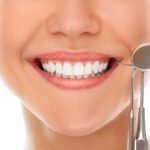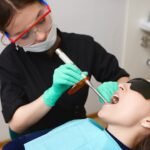Table of Contents
The Importance of Diet in Maintaining Oral Health

Maintaining oral health goes beyond just brushing and flossing; it also involves paying attention to what you eat. A well-balanced diet plays a crucial role in keeping your teeth and gums healthy. Foods rich in nutrients like calcium, phosphorus, and vitamin C contribute to strong teeth and healthy gum tissues. Conversely, a diet high in sugar and acidic foods can lead to tooth decay and gum disease.
Including plenty of fruits, vegetables, whole grains, and lean proteins in your diet can help support good oral health. These foods provide essential vitamins and minerals that are vital for maintaining the integrity of your teeth and gums. By making smart choices in your diet, you are not only nourishing your body but also safeguarding your oral health for the long term.
Common Foods that Promote Healthy Teeth and Gums
A diet rich in certain foods can play a key role in promoting healthy teeth and gums. Foods high in calcium, such as dairy products like milk, cheese, and yogurt, are essential for strong teeth and bones. These calcium-rich foods help protect enamel and strengthen teeth, reducing the risk of cavities and decay. Additionally, foods high in phosphorus, like fish, eggs, and lean meat, support the maintenance and repair of tooth enamel, keeping your teeth healthy and resilient.
Furthermore, incorporating crunchy fruits and vegetables into your diet can also benefit your oral health. Apples, carrots, and celery are excellent choices as their crunchy texture helps to scrub away plaque and debris from the surfaces of your teeth. These foods also stimulate saliva production, which helps to naturally clean the mouth and neutralize harmful acids that can cause tooth decay. By including a variety of nutrient-dense foods in your diet, you can support optimal oral health and maintain a bright, healthy smile.
Table
| Food | Benefit |
|---|---|
| Crunchy vegetables | Remove plaque, stimulate saliva, provide fiber and vitamins |
| Dairy products | Strengthen enamel, fight cavities, provide calcium and protein |
| Nuts | Strengthen enamel, stimulate saliva, provide fiber, calcium, and omega-3s |
| Leafy greens | Strengthen enamel, guard against gum disease, provide folate and vitamins |
| Onions and garlic | Fight bacteria, reduce inflammation, provide antioxidants and phytochemicals |
How Sugary Foods and Drinks Can Impact Oral Health
Sugary foods and drinks can have detrimental effects on oral health, especially when consumed in excess. When we consume sugary foods, the bacteria in our mouths feed on the sugars and produce acids that can wear down tooth enamel over time. This erosion can lead to cavities, tooth decay, and other oral health issues if not properly addressed. Furthermore, sugary drinks, such as sodas and fruit juices, contain high levels of sugars that can bathe the teeth in damaging acids, increasing the risk of dental problems.
Regular consumption of sugary foods and drinks can also contribute to the development of plaque, a sticky film of bacteria that forms on teeth. When plaque is not removed through proper oral hygiene practices, it can harden into tartar, leading to gum inflammation and potential gum disease. Moreover, the combination of sugary foods and poor oral hygiene habits can create an environment conducive to bacterial growth, further exacerbating oral health problems. It is essential to be mindful of the impact that sugary foods and drinks can have on our oral health and make conscious choices to protect our teeth and gums.
The Role of Nutrients in Preventing Gum Disease

Gum disease, also known as periodontal disease, is a common oral health issue that can lead to serious complications if left untreated. While regular dental hygiene practices are crucial in preventing gum disease, the role of nutrients in maintaining healthy gums should not be underestimated. Certain vitamins and minerals play a key role in supporting gum health, such as vitamin C, which aids in collagen production to keep gums strong and resilient. Additionally, vitamin D is essential for reducing inflammation in the gums and promoting overall gum health.
Another important nutrient for preventing gum disease is omega-3 fatty acids, which have anti-inflammatory properties that can help reduce the risk of gum inflammation and disease progression. Studies have shown that a diet rich in omega-3 fatty acids may help lower the incidence of periodontal disease and support gum tissue health. Incorporating these nutrients into your diet through foods like citrus fruits, leafy greens, fatty fish, and nuts can contribute to gum disease prevention and overall oral health maintenance.
The Link Between Vitamin Deficiencies and Oral Health Issues
Vitamin deficiencies can have a significant impact on oral health. In particular, a lack of Vitamin C can lead to scurvy, a disease that affects the gums and mucous membranes in the mouth. Symptoms of scurvy include bleeding gums, loose teeth, and slow wound healing. Vitamin D deficiency can also affect oral health as it is crucial for the absorption of calcium, which is important for maintaining strong teeth and bones.
Furthermore, a lack of Vitamin B complex vitamins, such as B2 (riboflavin), B3 (niacin), and B6 (pyridoxine), can contribute to oral health issues. These vitamins play a role in maintaining healthy oral tissues and can help prevent conditions like oral ulcers and inflammation. Ensuring an adequate intake of these essential nutrients through a balanced diet or supplementation can help support overall oral health and prevent vitamin deficiency-related oral health issues.
Healthy Snack Options for Stronger Teeth
When it comes to maintaining strong and healthy teeth, choosing the right snacks can play a significant role in supporting your oral health. Opting for snacks that are not only tasty but also beneficial for your teeth can help prevent cavities and strengthen your enamel. Nuts and seeds are excellent choices for snacks as they are rich in calcium and phosphorus, minerals that are essential for building and maintaining strong teeth.
Table
| Snack | Benefit |
|---|---|
| Yogurt | It provides fiber and vitamins, may stimulate saliva, and freshens breath |
| Cheese | Provides calcium and protein, and may reduce enamel demineralization |
| Nuts | Provides calcium and protein, and may protect teeth against cavities |
| Carrots | Provides calcium, protein, and omega-3s, and may strengthen enamel |
| Apples | Provides fiber and vitamins, may stimulate saliva, and freshens breath |
Fruits such as apples and pears are not only refreshing but also beneficial for your dental health. These crunchy fruits help stimulate saliva production, which aids in washing away food particles and bacteria from your teeth. Moreover, their natural sugars are less likely to cause cavities compared to sugary snacks and desserts. Incorporating these healthy snack options into your diet can contribute to stronger teeth and overall improved oral health.
How Hydration Affects Oral Health
Staying hydrated is crucial for maintaining optimal oral health. Water plays a vital role in flushing away food particles and bacteria that can lead to tooth decay and gum disease. Additionally, saliva production, essential for neutralizing acids and protecting tooth enamel, relies on adequate hydration levels. Dehydration can cause dry mouth, increasing the risk of dental issues.
When it comes to choosing beverages, water should be the top choice for keeping your mouth hydrated and healthy. Sugary and acidic drinks like sodas, energy drinks, and even some fruit juices not only lack hydration benefits but can also erode tooth enamel and contribute to cavities. It’s important to be mindful of what you drink throughout the day to support your oral health.
The Benefits of Eating a Balanced Diet for Dental Health
Eating a balanced diet not only benefits overall health but also plays a crucial role in maintaining optimal dental health. A diet rich in nutrients such as calcium, vitamin D, phosphorus, and vitamin C supports the development and maintenance of strong teeth and healthy gums. Including a variety of fruits, vegetables, whole grains, lean proteins, and dairy products in your daily meals can provide essential vitamins and minerals necessary for maintaining good oral health.

Furthermore, a balanced diet helps to reduce the risk of tooth decay and gum disease by limiting the consumption of sugary and acidic foods and beverages. These foods can contribute to the erosion of tooth enamel and the growth of harmful bacteria in the mouth, leading to cavities and other oral health issues. By prioritizing a well-rounded diet that nourishes your body and oral cavity, you can enjoy the long-term benefits of a healthy and radiant smile.
Foods that Naturally Whiten Teeth
Having a bright, white smile is often associated with good oral hygiene and overall health. While there are many teeth-whitening products available on the market, some foods can naturally help in maintaining those pearly whites. Certain foods contain properties that can help remove surface stains and promote whiter teeth, making them a valuable addition to your diet for oral health.
Strawberries, for example, are known for their malic acid content, which can help remove discoloration on teeth. Incorporating crunchy fruits and vegetables like apples and carrots in your diet can also help in naturally scrubbing away stains and plaque from your teeth. Additionally, dairy products such as cheese and yogurt contain calcium and phosphates that can strengthen enamel and promote whiter teeth by protecting against erosion and decay. By including these foods in your diet, you can support a brighter smile while also reaping the nutritional benefits they offer for your overall well-being.
The Dangers of Acidic Foods and Beverages on Tooth Enamel
Acidic foods and beverages pose a significant threat to tooth enamel, the protective outer layer of the teeth. When consumed in excess, these acidic substances can lead to enamel erosion, which weakens the teeth and makes them more susceptible to decay and sensitivity. Citrus fruits, sodas, sports drinks, and wine are common culprits that can erode tooth enamel over time.
The high acidity in these foods and drinks softens the enamel, making it more vulnerable to damage from brushing and chewing. Additionally, acidic erosion can result in tooth discoloration and increased risk of cavities. It is essential to limit the consumption of acidic foods and beverages and maintain good oral hygiene practices to preserve the strength and integrity of tooth enamel.
How Antioxidants Can Improve Oral Health
Antioxidants play a vital role in improving oral health by combating harmful free radicals that can damage the cells in our mouth. These powerful compounds help protect the gums and teeth from inflammation and infections, ultimately promoting a healthier oral environment. Foods rich in antioxidants, such as berries, nuts, spinach, and green tea, can provide the necessary support to fortify the body’s defense system against oral diseases.
In addition to their protective properties, antioxidants can also aid in reducing the risk of gum disease and oral cancer. Studies have shown that incorporating a variety of antioxidant-rich foods in your diet can contribute to better overall oral health. By actively consuming these beneficial nutrients, individuals can work towards safeguarding their teeth and gums from the harmful effects of oxidative stress, ultimately leading to a healthier and brighter smile.
The Connection Between Diet and Halitosis
Halitosis, commonly known as bad breath, can be a distressing oral health issue that affects individuals regardless of age. The foods we consume play a significant role in the freshness of our breath. Certain foods, such as onions and garlic, contain volatile compounds that can linger in the mouth and contribute to unpleasant odors. Moreover, sugary foods can also be culprits in causing bad breath as they promote bacterial growth in the mouth, leading to the release of foul-smelling gases.
In contrast, incorporating fresh fruits and vegetables into your diet can help combat halitosis. These foods are high in water content and fiber, which can help stimulate saliva production and naturally cleanse the mouth. Additionally, crunchy fruits and vegetables like apples and carrots can act as natural toothbrushes, scraping away plaque and debris that contribute to bad breath. By making conscious dietary choices and opting for breath-freshening foods, individuals can combat halitosis and maintain optimal oral health.
Nutritional Tips for Preventing Cavities
A healthy diet plays a crucial role in preventing cavities and maintaining optimal oral health. To prevent cavities, it’s essential to limit the consumption of sugary and acidic foods and beverages that can erode tooth enamel and contribute to the formation of cavities. Instead, focus on incorporating foods rich in essential nutrients like calcium, phosphorus, and vitamin C, which can help strengthen teeth and gums.
Opt for a diet that includes dairy products, leafy greens, nuts, and lean proteins to promote strong teeth and gums. Additionally, crunchy fruits and vegetables like apples and carrots can help stimulate saliva production, which is essential for washing away food particles and neutralizing harmful acids in the mouth. By making smart dietary choices and practicing good oral hygiene habits, you can significantly reduce your risk of developing cavities and other dental issues.
The Effects of Alcohol and Tobacco on Oral Health
Alcohol and tobacco are two common substances known to have detrimental effects on oral health. Regular consumption of alcohol can lead to dehydration, which in turn reduces saliva production. Saliva plays a crucial role in maintaining oral health by washing away food particles and bacteria. Additionally, alcohol consumption can increase the risk of oral cancer, as it irritates the tissues in the mouth and throat.
On the other hand, tobacco use, whether smoked or chewed, is one of the leading causes of oral health issues. Tobacco contains harmful chemicals that can damage the gums, teeth, and soft tissues in the mouth. It can lead to gum disease, tooth decay, oral cancer, and bad breath. Furthermore, the habit of smoking or chewing tobacco can interfere with the success of dental treatments such as implants or gum disease therapy.
How to Create a Dental-Friendly Meal Plan
Creating a dental-friendly meal plan is essential for maintaining optimal oral health. Start by incorporating a variety of nutrient-dense foods such as fruits, vegetables, lean proteins, and whole grains. These foods provide essential vitamins and minerals that support strong teeth and gums. Limit sugary snacks and beverages, as they can contribute to tooth decay and gum disease. Instead, opt for healthier alternatives like nuts, seeds, and dairy products, which can help neutralize acids in the mouth and strengthen tooth enamel.
Additionally, it’s important to stay hydrated throughout the day with water. Water helps wash away food particles and bacteria that can lead to plaque buildup and cavities. Include foods rich in calcium, such as dairy products or fortified plant-based alternatives, to support strong teeth and jawbones. Avoid frequent snacking between meals, as this can expose your teeth to acids and sugars that erode enamel. By following these simple guidelines and making mindful food choices, you can create a meal plan that promotes excellent dental health and overall well-being.
Can certain foods help naturally whiten teeth?
Yes, foods like apples, strawberries, and celery can help naturally whiten teeth due to their abrasive texture and natural enzymes that can help remove surface stains.
How does hydration affect oral health?
Staying hydrated is crucial for maintaining good oral health as it helps to produce saliva, which is essential for rinsing away food particles and bacteria that can lead to tooth decay and gum disease.
What role do antioxidants play in improving oral health?
Antioxidants help to reduce inflammation and fight off harmful bacteria in the mouth, which can help prevent gum disease and other oral health issues.
How can I prevent cavities through my diet?
To prevent cavities, it’s important to limit sugary and acidic foods and drinks, and instead focus on consuming foods rich in calcium, phosphorus, and vitamin D to strengthen tooth enamel.
What effects do alcohol and tobacco have on oral health?
Alcohol and tobacco use can increase the risk of gum disease, oral cancer, and tooth decay. It’s important to minimize or avoid these substances for better oral health.




